 Petzlover
Petzlover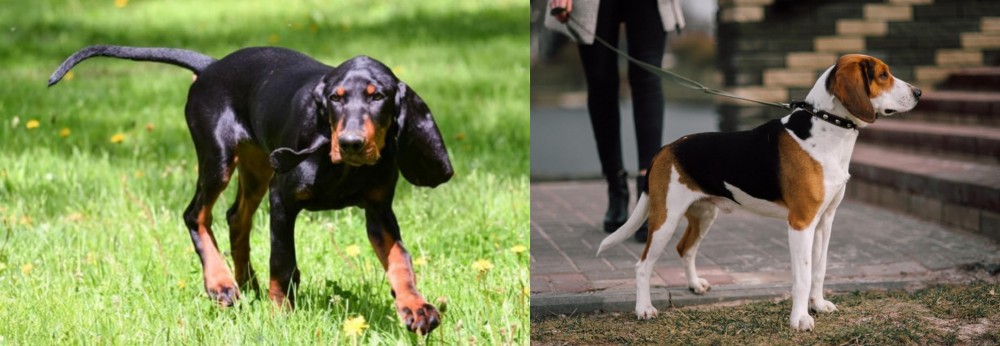 Black and Tan Coonhound is originated from United States but Estonian Hound is originated from Estonia. Black and Tan Coonhound may grow 17 cm / 7 inches higher than Estonian Hound. Black and Tan Coonhound may weigh 14 kg / 31 pounds more than Estonian Hound. Black and Tan Coonhound may live 3 years less than Estonian Hound. Both Black and Tan Coonhound and Estonian Hound has almost same litter size. Both Black and Tan Coonhound and Estonian Hound requires Moderate Maintenance.
Black and Tan Coonhound is originated from United States but Estonian Hound is originated from Estonia. Black and Tan Coonhound may grow 17 cm / 7 inches higher than Estonian Hound. Black and Tan Coonhound may weigh 14 kg / 31 pounds more than Estonian Hound. Black and Tan Coonhound may live 3 years less than Estonian Hound. Both Black and Tan Coonhound and Estonian Hound has almost same litter size. Both Black and Tan Coonhound and Estonian Hound requires Moderate Maintenance.
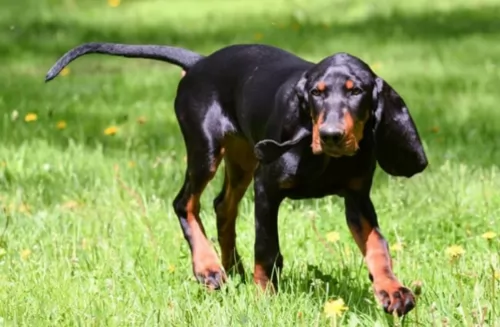 Descendent of the English Talbot Hound, the Black and Tann Coonhound is nevertheless an American creation. Developed by crossing the Black and Tan Virginia Foxhound with the Bloodhound in the very early years of the American experience. It is said that George Washington owned several. The very first Coonhound that was given American Kennel Club registration was the Black and Tan in 1945. They had been admitted to the United Kennel Club in 1912. The Black and Tan Coonhound is a traditional hunting dog – known by hunters as a “trail and tree hound”. This is a dog that finds its prey and trees it. They have incredibly strong instincts to hunt and need to hunt. They can track their prey for miles and if they have a scent you cannot get their attention back. They have been valued because they can “cold track”, following the scent of an animal that left the scene long ago. They are known to have tracked mountain lions and bears as well as deer and coon. They were developed to keep the American settlers safe and well fed, but also to keep them company on the trails or by the fireplace. They are the American Dog.
Descendent of the English Talbot Hound, the Black and Tann Coonhound is nevertheless an American creation. Developed by crossing the Black and Tan Virginia Foxhound with the Bloodhound in the very early years of the American experience. It is said that George Washington owned several. The very first Coonhound that was given American Kennel Club registration was the Black and Tan in 1945. They had been admitted to the United Kennel Club in 1912. The Black and Tan Coonhound is a traditional hunting dog – known by hunters as a “trail and tree hound”. This is a dog that finds its prey and trees it. They have incredibly strong instincts to hunt and need to hunt. They can track their prey for miles and if they have a scent you cannot get their attention back. They have been valued because they can “cold track”, following the scent of an animal that left the scene long ago. They are known to have tracked mountain lions and bears as well as deer and coon. They were developed to keep the American settlers safe and well fed, but also to keep them company on the trails or by the fireplace. They are the American Dog.
 In 1947, the Estonian Hound was developed and remains today the only pure breed ever developed in Estonia. At that time the national economic minister of the Soviet Union declared that every country in the USSR must have a national dog breed. Thus, the Estonian Hound and the Estonian Kennel Union were born. The Kennel Union is currently seeking breed recognition from the Federation Cynoloqique Internationale.
In 1947, the Estonian Hound was developed and remains today the only pure breed ever developed in Estonia. At that time the national economic minister of the Soviet Union declared that every country in the USSR must have a national dog breed. Thus, the Estonian Hound and the Estonian Kennel Union were born. The Kennel Union is currently seeking breed recognition from the Federation Cynoloqique Internationale.
The Estonian Hound came from breeding local Estonian hunting dogs with several different breeds of foreign dogs. The Soviet decree also established that hunting dogs had to be no more than 17 inches high. This result in a hunting dog with great agility and drive that is extremely popular in now inependent Estonia. It is the national dog.
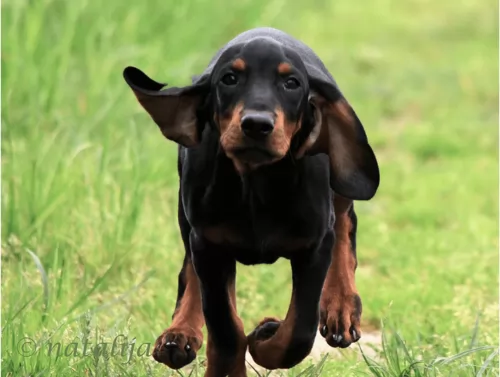 The Black and Tan Coonhound looks like we all imagine a coonhound would look. They have strong and muscular legs, an oval skull and a scissors bite. They have brown or hazel eyes that are very expressive. The ears of course are long like the bloodhound, far back on the head and thin. His nose is amazingly sensitive as he is scent hound. His nostrils are always black. He is a large, strong dog.
The Black and Tan Coonhound looks like we all imagine a coonhound would look. They have strong and muscular legs, an oval skull and a scissors bite. They have brown or hazel eyes that are very expressive. The ears of course are long like the bloodhound, far back on the head and thin. His nose is amazingly sensitive as he is scent hound. His nostrils are always black. He is a large, strong dog.
 The Estonian Hound is a strong, muscular body of medium size, with well-developed muscles and strong bones. It has a straight muzzle and skull with defined eyebrows and long drop ears. They have black noses and dark eyes. Their back is wide and straight, and their chest is deep and wide. They have skin that is tight with no wrinkles or folds anywhere.
The Estonian Hound is a strong, muscular body of medium size, with well-developed muscles and strong bones. It has a straight muzzle and skull with defined eyebrows and long drop ears. They have black noses and dark eyes. Their back is wide and straight, and their chest is deep and wide. They have skin that is tight with no wrinkles or folds anywhere.
The Estonian Hound is double coated, but the undercoat is not well developed. The top coat is rough, short and shiny. The tail has a thick covering of hair. The color is usually white with red patches, black or brown patches or yellow patches.
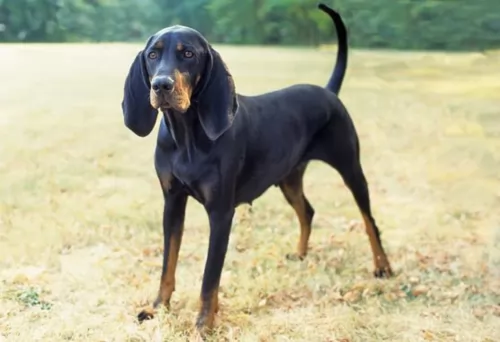 The Black and Tan Coonhound is intelligent, calm, affectionate, independent, strong, and stubborn. They love children and are gentle with them, but they are also very independent and may not do what the child wants them to do in play. They are loyal to their family and will bay at strangers. They are incredibly adaptable and happy-go-lucky. They will end up on the couch or bed so don’t try to fight it. They like cars and enjoy traveling. If you get a BTC be ready for that booming voice.
The Black and Tan Coonhound is intelligent, calm, affectionate, independent, strong, and stubborn. They love children and are gentle with them, but they are also very independent and may not do what the child wants them to do in play. They are loyal to their family and will bay at strangers. They are incredibly adaptable and happy-go-lucky. They will end up on the couch or bed so don’t try to fight it. They like cars and enjoy traveling. If you get a BTC be ready for that booming voice.
 The Estonian Hound is a happy dog and loves to play with children. He was bred to hunt though and he can get fixated on a scent and knock over a small child.
The Estonian Hound is a happy dog and loves to play with children. He was bred to hunt though and he can get fixated on a scent and knock over a small child.
He is a hunting dog with great agility and drive.
He has had to be adaptable through his short history and is now more a companion than a hunting dog. He can live in the city or country.
He is intelligent and trainable. He is lively and energetic and the challenge might be keeping his attention long enough to train.
 With such a young breed there have not been any studies done on their health or genetic issues. It seems the breed is fairly healthy but there is too little information to really say. Being confined to Estonia there has been little commercial or backyard breeding. He is less likely than most pure breeds to have genetic issues.
With such a young breed there have not been any studies done on their health or genetic issues. It seems the breed is fairly healthy but there is too little information to really say. Being confined to Estonia there has been little commercial or backyard breeding. He is less likely than most pure breeds to have genetic issues.
It is likely that dogs of his type are at risk for:
Caused by excessive exercise before or after having eaten a large meal. It is suggested that you feed your English Setter twice a day, smaller meals and not right before or after strenuous exercise.
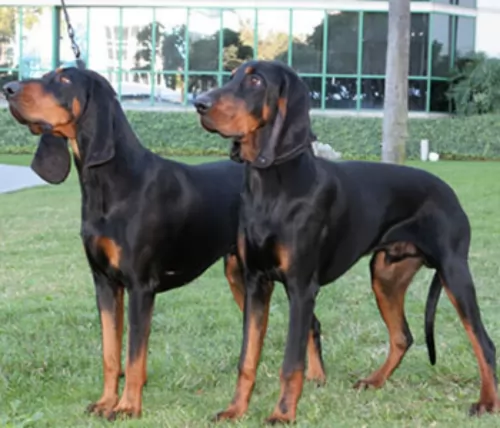 This coonhound is a big, rugged, working dog and needs to be fed accordingly. Feed him at least twice a day in smaller portions and not right before or right after exercise. Don’t send him on a hunt with a full stomach. Don’t overfeed.
This coonhound is a big, rugged, working dog and needs to be fed accordingly. Feed him at least twice a day in smaller portions and not right before or right after exercise. Don’t send him on a hunt with a full stomach. Don’t overfeed.
Not that the Black and Tan Coonhound is lazy, but he can be a couch potato when he is not working. He needs moderate exercise everyday and he does well at activities like barn hunt and field games. If he does catch a scent outdoors and he is not confined in a fence, he will follow the scent with no attention to your calls at all. He can run for miles on end when pursuing prey, but he’d also enjoy just jogging along side you or your bike. He loves long walks but make sure he is on a leash and can’t follow his nose.
 Feed a high quality dry food made for puppies. Feed ¼ to ½ cup per day in 2-3 meals for the first six months.
Feed a high quality dry food made for puppies. Feed ¼ to ½ cup per day in 2-3 meals for the first six months.
Feed 1 to 2 cups in two meals from 6 months to a year or so.
Feed about 2 to 3 cups in two meals.
As previously mentioned this seems to be a fairly healthy breed.
Be careful not to feed a large meal before or after exercise due to possibility of bloat.
Check their ears and clean them periodically.
The Estonian Hound is a hunting dog and needs a good deal of exercise – at least an hour and a half every day or a long walk if not used for hunting. He is a working dog with a lot of energy and stamina. Don’t let him off leash though or he will follow his nose and take off. He is usually calm and quiet indoors if he gets enough physical and mental stimulation outdoors. He can be destructive and loud, nervous and hyper if he doesn’t. They enjoy Frisbee, agility, tracking and of course hunting.